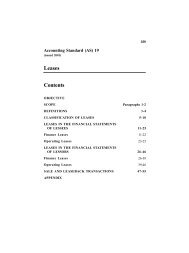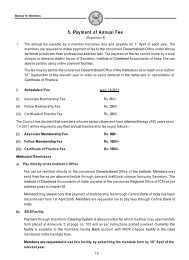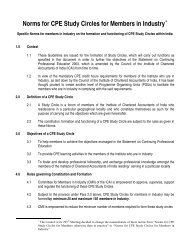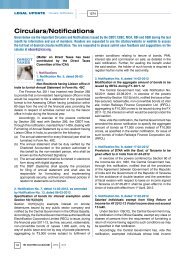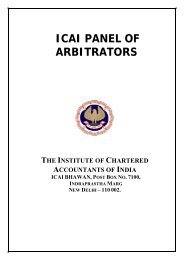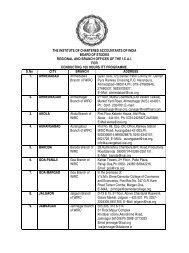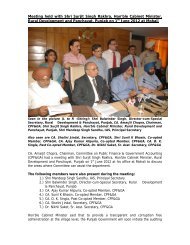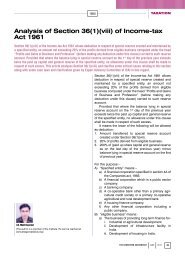The Chartered Accountant
The Chartered Accountant
The Chartered Accountant
Create successful ePaper yourself
Turn your PDF publications into a flip-book with our unique Google optimized e-Paper software.
EDITORIAL<br />
<strong>The</strong> G-20 summit, called to ponder over the worst financial<br />
crisis in over 70 years, had many takers for India’s<br />
three point emphasis— on the need for a ‘global<br />
oversight’ and greater say for developing countries in the<br />
global financial system; need to ensure that prospects<br />
of emerging economies do not suffer; and the need to<br />
avoid the protectionist tendencies. <strong>The</strong> six-point action<br />
plan mooted at the G-20 summit also reflected the<br />
spirit of Indian stand on tackling the crisis, particularly<br />
the concern voiced by Prime Minister Dr. Manmohan<br />
Singh that the financial meltdown had exploded into<br />
a systemic crisis requiring a coordinated approach by<br />
world leaders. <strong>The</strong> broad plan included short-term action<br />
such as fiscal stimulus to boost domestic demand,<br />
restarting world trade talks, and expanding financial stability<br />
forum to emerging economies. It also agreed to<br />
long-term steps such as reforming the International<br />
Monetary Fund.<br />
Leaders of the G-20 made all the right<br />
noises on the need for greater transparency,<br />
regulation and international<br />
cooperation despite inevitable gaps<br />
in perception between major players—<br />
the US, Europe and developing<br />
countries. But those who looked<br />
upon G-20 summit as the ‘next Bretton<br />
Woods’– <strong>The</strong> Historic talks after<br />
World War II that led to a dollar-led<br />
new world economic order, are of course<br />
disappointed at its rather innocuous and nonconcrete<br />
conclusion. It is now obvious that the West<br />
will not countenance a new power structure beyond the<br />
G-7, whose heads still don’t seem to see anything wrong<br />
in the BRIC group not having legitimate say in global<br />
economic affairs.<br />
Prime Minister Dr. Manmohan Singh was forthright in<br />
campaigning for ‘inclusivity’ and greater say for developing<br />
countries, particularly India, in the global financial<br />
system. India, as a $1 trillion economy, has indeed a<br />
vital stake in the stability of the international economic<br />
and financial system. <strong>The</strong> prevailing global crisis has<br />
reinforced the need to have a new and more inclusive<br />
order of global oversight. India’s viewpoint that such a<br />
global oversight is a must to put in place an ‘early warning<br />
mechanism’ should be taken and acted upon seriously<br />
by the world leaders, particularly since the World<br />
Bank and IMF have virtually failed to provide such a<br />
mechanism. As a common regulation framework on<br />
global scale is too ambitious, India has rightly pitched<br />
for common prudential and regulatory standards for<br />
all financial institutions in the world and a convergence<br />
G-20 Summit and India<br />
of accounting standards to prevent collapse of global<br />
financial institution. Of course there should not be<br />
overregulation, but there must be some way by which<br />
countries can have global oversight with commonly accepted<br />
regulatory and prudential standards overseen by<br />
national regulators. It is welcome that the G-20 summit<br />
supported an action plan to reform the multilateral financial<br />
institutions and agreed to establish supervisory<br />
colleges for major cross-border financial institutions but<br />
what remains a matter of concern is that it fell short of<br />
announcing major regulatory breakthroughs.<br />
<strong>The</strong> second point of India’s stress at the G-20 meeting<br />
had been that the developing countries that are able to<br />
drive economic growth, particularly BRIC, should not<br />
suffer in the period in which the world grapples with the<br />
economic crisis. This meant that resources should<br />
be made available to such countries so that<br />
they can continue to grow and drive economic<br />
growth. It is good that the G-20<br />
has agreed to help shore up liquidity in<br />
developing world.<br />
Thirdly, as has been rightly pointed out<br />
by Finance Minister P Chidambaram,<br />
the crisis should not be an excuse for<br />
the countries to go into a protectionist<br />
cocoon. Without the free flow of goods,<br />
services and capital, the world cannot recover<br />
and get back to the path of growth. It was<br />
indeed heartening to note the G-20 unity on the need to<br />
desist from trade protectionism and complete the Doha<br />
Round of talks.<br />
In the current scenario, global markets needed their political<br />
leaders to send out a signal of confidence and<br />
the G-20 summit probably has done enough to assuage<br />
fears. But the point of concern is that no mechanism<br />
exists to oversee the economic action plan agreed by<br />
world leaders at the summit. It is also not quite clear<br />
yet as to whether the incoming US administration was<br />
wholly on board with what the George W. Bush's team<br />
agreed at the meeting. As such, perhaps the more critical<br />
meeting will be the one scheduled for April 30, 2009—<br />
that’s were the fine print will be discussed. India should<br />
aim to be an influential voice of emerging economies at<br />
that meeting.<br />
— Editorial Board<br />
ICAI- Partner in Nation Building<br />
THE CHARTERED ACCOUNTANT 943 DECEMBER 2008



